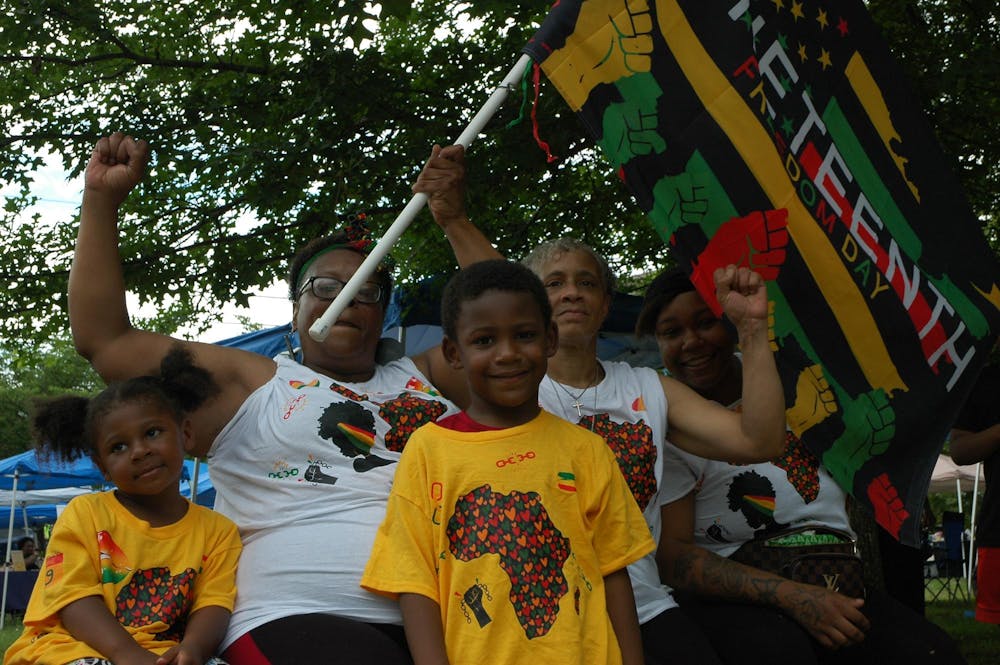Juneteenth, also known as Freedom Day, Jubilee Day or Liberation Day, commemorates the end of slavery in the United States. In 2021, President Joe Biden declared June 19 a federal holiday, marking the date in 1865 when enslaved African Americans in Galveston, Texas received news of their freedom, two years after the Emancipation Proclamation.
This year, Charlottesville is marking the 160th anniversary of Juneteenth with a variety of community events, including celebrations held today at Eastwood Farm and Winery, Historic River View Farm and The Art Bar. But for many residents, the festivities began Saturday morning, when more than 400 attendees gathered at the Jefferson School City Center to kick off the week.
Organized by the Jefferson School African American Heritage Center — a cultural arts and history center dedicated to preserving the history of Charlottesville and Albemarle’s African American community — Saturday’s event opened with a parade and continued with an afternoon festival featuring food, vendors and live music.
The celebration honored the Black communities that have long been a cornerstone of local life. Parade participants filled the streets with energy as they drove by, playing upbeat music and tossing candy from decorated vehicles. Those on foot waved Juneteenth banners and performed dances, while a procession of motorcyclists brought up the rear.
The parade route stretched just under a mile, connecting Burley Middle School and the Jefferson School. Both buildings, which opened in 1951 and 1865 respectively, served as Black-only schools until the mid 20th century. According to JSAAHC Executive Director Andrea Douglas, parading between the two sites paid tribute to the historically Black neighborhoods in Albemarle County.
“It’s not a very long stretch … but it’s a significant mile,” Douglas said. “We're walking through the heart of a Black community.”
Although Juneteenth was only recognized as a federal holiday four years ago, several communities have observed it locally since the 19th century. Charlottesville’s first public Juneteenth celebration took place in 2000 at a recreation center on Ninth Street, organized by Tamyra Turner, a former professor at Piedmont Virginia Community Center. With the help of local teacher Maxine Holland, Turner hosted the event at PVCC until it moved to the JSAAHC in 2016.
The return to a residential area was not just about location. Douglas said celebrating Juneteenth at the Jefferson School holds profound meaning for Black community members.
“Bringing [the celebration] back here is symbolic because this is the African American school,” Douglas said. “In 1926, when the original high school was [built], it meant that every Black person could receive an education in Charlottesville … It’s that center grounding place.”
Charlottesville also observes Liberation and Freedom Day each March 3 to honor the day over 14,000 enslaved local residents were liberated in 1865. But Juneteenth remains one of the city’s largest Black-led public celebrations. In recent years, the JSHAAC has worked to further expand its reach and increase community participation.
“The original Juneteenth here … was about getting people deeply embedded in understanding the history,” Douglas said. “At some point, we kind of switched our motivations and began really wanting to do events that were about the community.”
One result of that shift was the Juneteenth parade, which was implemented in the past five years to showcase Black businesses, organizations and pride. Saturday’s participants included car clubs, healthcare workers, First Baptist Church and Delta Sigma Theta Sorority, Incorporated. This year also featured the JSAAHC’s first ever Juneteenth pageant, which awarded sashes to young children and invited them to ride on a decorative float.
For the second year in a row, Saturday’s celebration coincided with the Charlottesville-Albemarle Black Business Expo, an annual event co-hosted by Lifeview Marking and WTJU 91.1 FM. More than 30 vendors filled the Jefferson School yard, offering everything from food and clothing to health products and consulting services. Panel discussions and business pitches also gave attendees a closer look at Black entrepreneurship.
WTJU General Manager Nathan Moore said the expo began in 2017 to support Black households in the wake of the “Unite The Right” rally. Today, it aims to uplift Black-owned businesses facing ongoing barriers, from the mid-1960s destruction of Vinegar Hill to the economic impact of COVID-19.
“We can see it very locally — discrimination toward Black families, Black households and Black business owners,” Moore said. “To get to that next step … to build wealth, to build a community where people can thrive and succeed — this [expo] hopefully helps do that.”
Business owners could feel that support firsthand as the Jefferson School transformed into a hub of activity during the event. Older attendees browsed the rows of products, while children darted between tents, laughing and eating Italian ice.
Carrington Epperson, owner of Chanterelle Cafe and Class of 2018 alumna, showcased a variety of vegan and allergen-friendly baked goods. For her, Juneteenth is about empowering the Black community with the freedom of choice.
“Some of our traditional foods came historically from enslavement. We didn't have a choice back then, but we do have a choice now to have better food for ourselves … and to be free to dress how we like and speak how we want,” Epperson said. “It's very liberating.”
Beyond the vendor tents, attendees joined line dances near the stage and swayed to live performances by Jen Tal and Ebony Groove. Under a shaded tree, Douglas reflected on how the celebration has evolved over the past decade, transforming into a day to not only preserve history but to spread joy and strengthen community.
“This idea of celebration and the idea of community building is what binds us together,” Douglas said.







